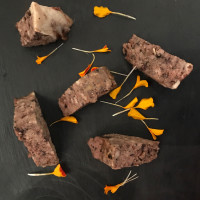Boka nu
Feedback
Bidra med feedbackNice experience at the Ephémère, great service, good and real French food. We all had the gallettes and also tried the desserts. Location is relaxing, and not crowded, in the final part of the Tiber riverside towards Porta Portese.
Great experience there. On the banks of the river Tevere, this french ginguette surprised us. I loved the pastries and could taste great Champagne also.
Destined a visit worth and located near the oldest bridge in rom called ponte fabricio and basilica di san bartolomeo. the place is located near the quarter travestere and there are many beautiful Italian buildings and facilities, restaurants, caffes in the victorious.
This is the other bridge that connects the Tibetan island with trastevere, built by the cesstius lucio, in the year when cesare departed for the spagna campaign, when he assumed the government of roma invested in the office of administrator of the city. For this reason, I often feel like I'm here looking at it, because it has the charm of a historical event that I like to remember. even if it is completely different from the original construction, damaged several times by the floods of the weaver. in many have painted it, for example the artists of the so-called “First Roman School”, who loved to portray it from unusual points of view, so much to transfigure it and make it almost unrecognizable or suspended in bruises and unnatural atmospheric chromatisms.
The cestio bridge, which connects the trastevere zone (long-termilk of the eels) to the Tiberine Island, is one of the oldest ones of roma, in fact the first edification took place in 46 BC, several times it was rebuilt (also using the travertine of the marcello theater) and until about 1890, had a larger central arch and the two smaller side. with the above need to widen the river bed and the construction of the city walls to defend the city from the danger of the floods, it became necessary to dismantle it and make it longer (from 48 meters to 83,) therefore in the current form, with the three arches of equal size. Although in the different form, he tried to reuse the original materials, especially in the central arch. in the center of the parapet is placed an ancient inscription on the restorations occurred in 370 AD note1: temporally we can divide the bridges of roma that overlook the tevere in four epochs: 1) the Roman bridges, which began to build when they had control of both banks of the river, start from the ii century BC until the iv century AD 1a) for many centuries no bridges were built on the Tiber (from the v century to the xiv century) 2) the bridges built under the papal state, about from the xv century until the xix century, before the 20 September 1870 date of the grip of the pia-door rome. (The last bridge built was the one called of the industry in the marconi area, built in 1863) 3) the bridges built from the unit of Italy until 1944, are those related to the epoch of the monarchical Italy, the last was the Amedean prince savoy aosta bridge, inaugurated in 1942. there are some bridges whose construction began in this period, but cause war, were finished after 1945. 4) the bridges built since 1945, related to republican Italy. note2: this place is part of those painted by the great painter ettore roesler franz in the series of “Roma Sparita”, 120 watercolors of the size of about 50 x75, made between 1878 and 1896. The artist with these representations, wanted to save the image of ancient and popular roma places that already in that era were disappearing, thanks to him so we can have the idea of how the city still showed in the xix century. This beautiful collection (now 119 paintings are available) is present in the museum of roma in trastevere.
Hela menyn
Mer information
QR-kodlänk till menyn







